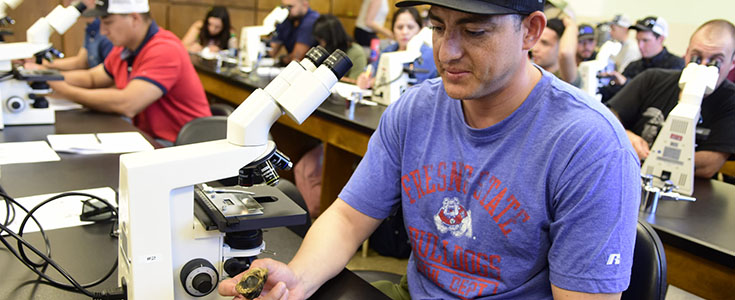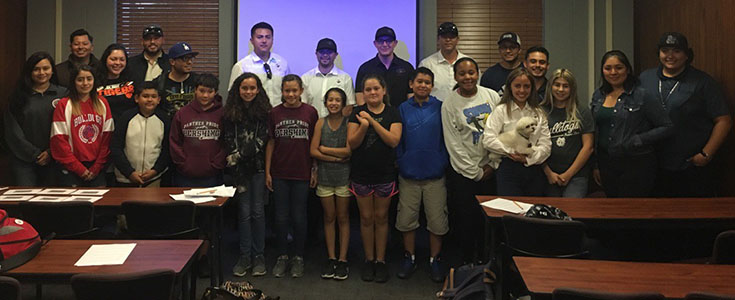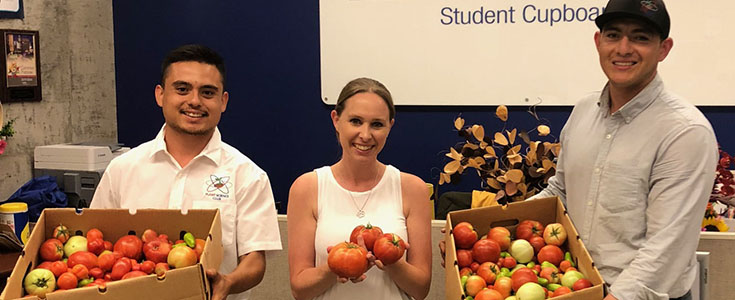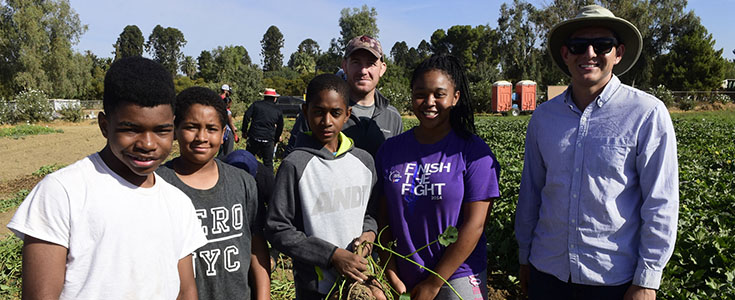The Jordan College of Agricultural Sciences and Technology
| Picture | Caption(yes/no) | Caption Text |
|---|---|---|
 |
yes | Fresno State plant science student Ignacio Mendoza in plant pathology class. |
 |
yes | Fresno State Plant Science Club officers and members answer questions from John J. Pershing Elementary students about growing plants in space using aeroponics and hydroponics. |
 |
yes | Fresno State Plant Science Club students donate food from a campus farm plot to the campus cupboard to help students dealing with food insecurity issues. |
 |
yes | Fresno State Plant Science Club students volunteer with West Fresno Resource Center students and staff to raise & help harvest sweet potatoes for their community outreach project and fundraiser. |
Hispanic Heritage Month Student Feature
Fresno State senior Ignacio Mendoza is a perfect example of the campus’s connection to Central California agriculture and its emphasis on attracting first-generation college students.
His parents, Jose and Maricela Mendoza, emigrated from Mexico to the United States as teenagers in search of a brighter future. They initially worked as field laborers before being promoted, and now they have their own farm business near Salinas that employs other family members.
While he was growing up, Ignacio followed their lead and worked part-time for their operation, Mendoza Berry Farms, and assisted in a variety of production and soil management responsibilities. The 50-acre farm uses both organic and conventional methods to grow strawberries primarily.
That experience led to a California Strawberry Commission job where he provided pest and beneficial insect scouting, tractor sprayer calibration and bug vacuum education.
Naturipe Berry Growers also utilized his skills in organic strawberry soil research and managing irrigation and soil moisture equipment.
With all his hands-on agricultural experience entering college, the Salinas native was surprisingly still hesitant when considering his academic and professional direction.
“Seeing my family work from dawn to dusk and how daunting a job it is, I initially didn’t want to choose agriculture as a career,” Mendoza said, “but now I feel privileged to work with the land to produce food and get a college degree tied to it.”
This year Mendoza is serving as the president of the campus plant science club, which is dedicated to community outreach and agronomy education.
He has been a part of club efforts to grow vegetables that are donated to the Fresno State Student Cupboard and the Poverello House charities and has volunteered with renovations to the Valley Children’s Hospital therapy garden. Most recently, he has helped organize an outreach project with the West Fresno Family Resource Center that teaches youth how to plant, grow and harvest sweet potatoes.
His interest in sustainability also was tapped by former plant science faculty member Dr. Jorge Gonzalez and his research on the effects of nanoparticles on honeybees in an effort to reduce colony collapse disorder.
“I have to thank my professors and previous plant science club officers,” Mendoza said. “They have seen potential in me and encouraged me to take on new challenges that have been rewarding and eye-opening. When I was young I was diagnosed with a learning disability and other early hardships taught me to persevere and ultimately realize that new experiences create new ways to grow. I initially wasn’t sure about going to Fresno State, but after I met Marlene (Miyasaki, plant science department administrative assistant), I knew this was the place for me. She cared for me like a mother, and this department has become a second family to me.”
Thanks to his academic excellence, student leadership and career goals, he was one of 10 students honored nationally in June as a Greenfield Scholar by the American Society of Agronomy and the International Certified Crop Adviser program (and the only selection from a Western university).
The award will also earn him a free trip to attend the organization’s annual conference November 4 to 7 in Baltimore, Maryland that will attract 7,000 scientists, professionals, educators and students.
He was also one of 20 college students nationally this past summer that received a $10,000 Annie’s sustainable scholarship, and one of several $2,500 academic grant recipients from the California Certified Organic Farmers (CCOF).
Students were selected based on their commitment to enhance natural resources and farm communities through soil health, aboveground biodiversity, resilient farm practices and/or organic community involvement.
“I truly value the soil around us,” Mendoza said, “and all of its elements are vital to human life. As a society we’re becoming disconnected, and the environment is paying the price. It is something we should take care of since the earth is fragile and easily taken for granted.”
With his 3.5 college GPA, he is on track to be the first family member to graduate either from college or high school. After graduation next spring, he plans on getting his pest control adviser (PCA) and certified crop adviser (CCA) licenses. Graduate school is another attractive potential career path where he could share his passion for agriculture and education with others.
“I want to help create better and healthier food systems,” Mendoza said. “Where I grew up was fairly rough, with lots of distractions and sometimes dangerous situations for kids. Agriculture has protected and provided for me, and my family’s example has taught me about hard work and dedication. My dad didn’t need to have a PCA license to be a good steward of the Earth and always encouraged beneficial insect populations and a safe and ethical workplace. He truly loved his job and took pride in providing food for others. Agriculture depends on a collective, good conscious effort so we can share the land with future generations.”